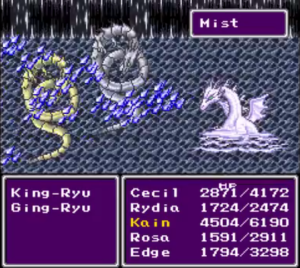Ryuutama mechanizes a limited degree of referee fudging through a conceit where the referee plays a character called the ryuujin. In translation, this means dragon person, and represents an entity somewhere between minor deity and guardian angel. The ryuujin exists within the fictional world, but in practice stays mostly offscreen. It is actually a character though, with a record sheet, life points, powers, level, and so forth, though the applicable rules for a ryuujin are different than those for player characters.
In Final Fantasy 4, the character Rydia is a caller, a kind of magician that can summon Eidolons, or Call Beasts, to fight for the party. In Final Fantasy 6, espers are powerful magical entities that once defeated can be summoned. Systems exist for summoning in many Final Fantasy games.
Can you see where I am going with this?
A similar structure could be used for a powerful supernatural ally such as a bound demon, sandestin, or summoned creature. For players used to a more limited scope of narrative influence and narrower tactical challenge, the ryuujin rules can seem to be something between easy mode and cheating. However, that interpretation may be more driven by tone rather than mechanics. With slightly different flavoring, and possibly exposing more aspects of the ryuujin record sheet to the party as a whole, similar rules could support access to something like summoning an esper. Consider also the possibility for something like a mech or titan form (Attack on Titan, Voltron, etc).
Mechanically, Ryuutama gives the ryuujin several capabilities, including benedictions and reveils. Benedictions are powers that a ryuujin can use by spending life points and have effects such as rewinding a small amount of fictional time or declaring a particular check to be a critical success. Some benedictions create obstacles for players, such as increasing monster power or allowing an enemy to run away without needing to satisfy any conditions, presumably in support of guaranteeing certain story elements. In a reveil, the ryuujin appears in dragon form and saves the players in some specific way, such as manifesting to take the damage intended for a player character. Even when representing something like a summoned ally more under the control of players than is the ryuujin, the entity could maintain a degree of autonomy, also causing complications for players occasionally.
Some of the ryuujin rules are attempts to mechanize a limited degree of referee discretion while maintaining some impartiality. Others are explicitly for rescuing and assisting the travelers, essentially decreasing the stakes in pursuit of the intended tone, which is low-arousal, calming, and heartwarming (honobono, in Japanese). However, with a slightly different set of priorities, similar rules could mechanize access to limited supernatural heavy artillery that players could deploy a few times per session.


